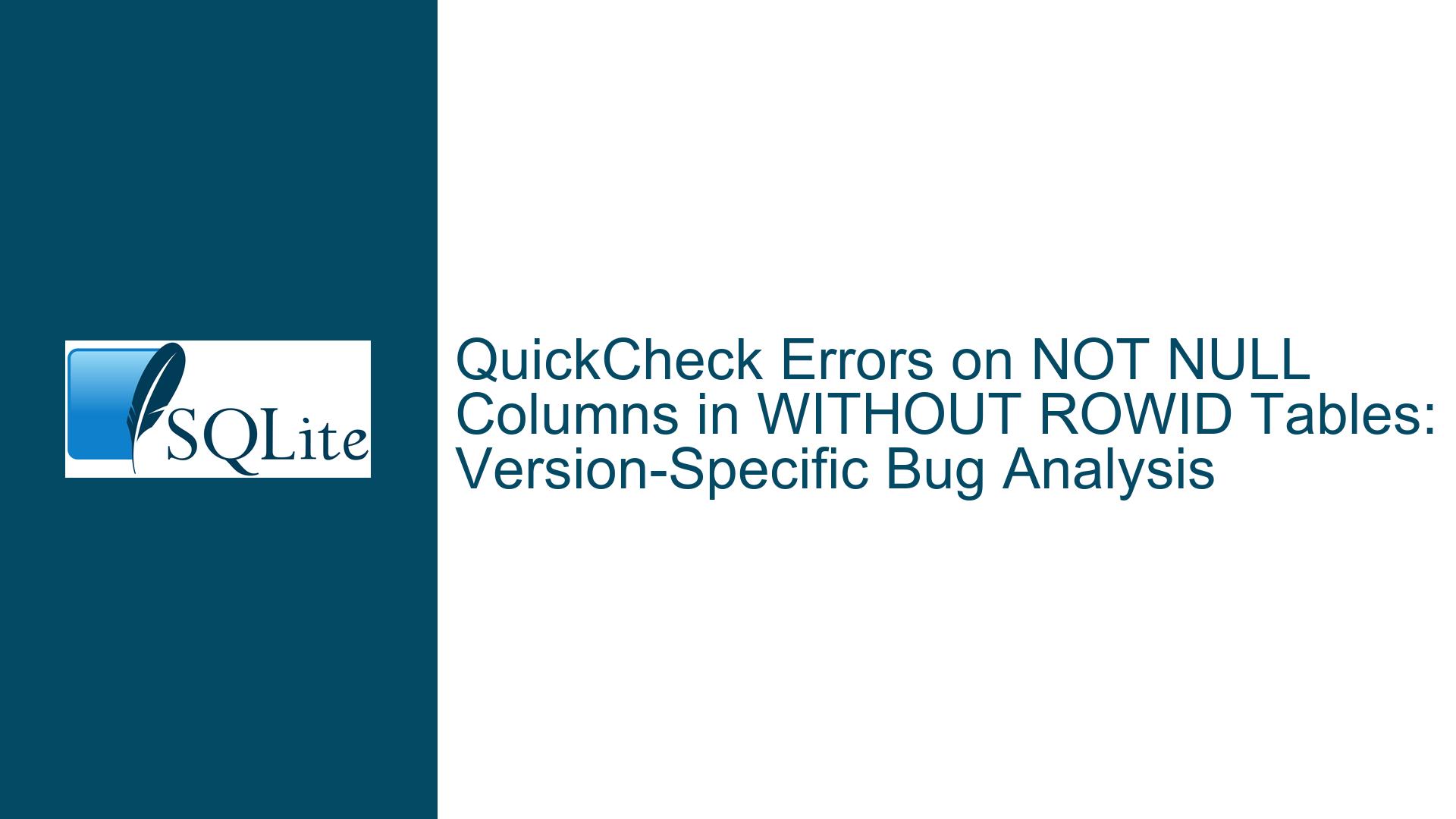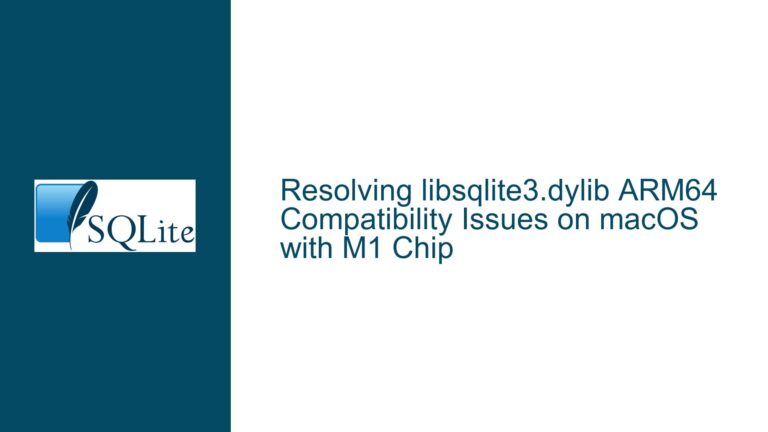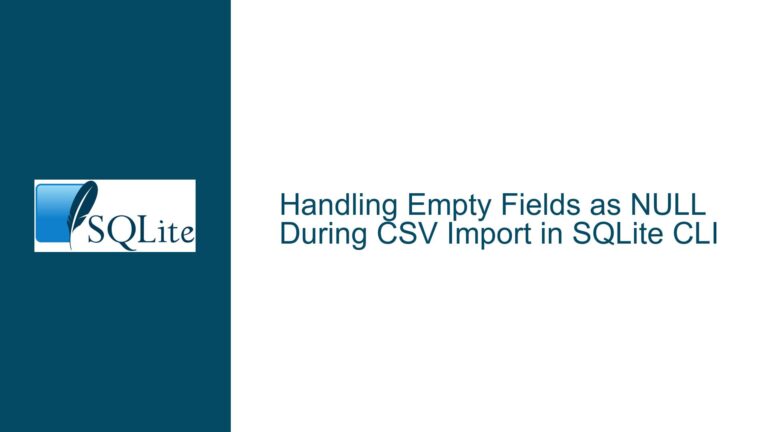QuickCheck Errors on NOT NULL Columns in WITHOUT ROWID Tables: Version-Specific Bug Analysis
PRIMARY KEY Column Order Mismatch in WITHOUT ROWID Tables Triggers False NULL Warnings
Root Cause: Composite Primary Key Declaration Order vs Column Declaration Order
The core issue revolves around SQLite’s handling of column constraints in WITHOUT ROWID tables when there’s a mismatch between the declared order of columns and their position in a composite primary key. Specifically, versions 3.40.0 through 3.41.0 introduced a regression where:
- The
PRAGMA quick_checkcommand falsely reports NULL values in NOT NULL columns - This occurs only when:
- The table uses WITHOUT ROWID
- The composite PRIMARY KEY declaration order differs from the column declaration order
- All affected columns are explicitly marked NOT NULL
- The bug manifests as false positive errors about NULL values in columns that cannot logically contain NULLs based on both schema constraints and inserted data
This creates a critical discrepancy between the lightweight quick_check and full integrity_check mechanisms. The false warnings undermine trust in database validation tools while leaving actual data integrity unaffected.
Version-Specific Behavior and Storage Engine Interactions
The bug’s version dependency (3.40.0+ vs ≤3.39.4) stems from changes to SQLite’s b-tree storage layer for WITHOUT ROWID tables. Key implementation details:
Storage Format for Composite Keys
- In WITHOUT ROWID tables, the primary key columns are stored as the prefix of the b-tree key
- Column order in the PRIMARY KEY clause dictates their physical storage order
- When column declaration order differs from PRIMARY KEY order, SQLite must map logical column indexes to physical storage positions
Version 3.40.0 Optimization Changes
- The 3.40.0 release (2022-11-16) introduced performance optimizations for WITHOUT ROWID table access
- These included changes to how the query planner handles column indexes in tables with non-aligned declaration/PK orders
- A specific optimization for
quick_check’s table scanning logic failed to account for column order mismatches when verifying NOT NULL constraints
How This Causes False NULL Reports
quick_checkperforms a fast but less comprehensive verification:- Scans table b-trees directly
- Uses storage-layer column indexes (based on PRIMARY KEY order) rather than schema-defined logical order
- When logical and storage column orders differ:
- The NOT NULL constraint check uses the wrong column index
- Columns are validated against incorrect storage positions
- Non-NULL values in later storage positions are misinterpreted as NULLs in earlier logical positions
Example Breakdown Using Original Schema
- Declared columns:
error_id(col 0),post_id(col 1) - PRIMARY KEY: (
post_id,error_id) → storage order reverses columns - Storage layer columns:
post_id(storage col 0),error_id(storage col 1) quick_checkerroneously validates logicalerror_id(schema col 0) against storage col 0 (post_id), which contains integer values- Since storage col 0 (
post_id) is NOT NULL, butquick_checkthinks it’s checkingerror_id, it misreports NULLs
Resolution Strategies and Version-Specific Workarounds
Immediate Fix: Column Order Alignment
Reorganize the table schema to match PRIMARY KEY order:
CREATE TABLE post_errors (
post_id INTEGER NOT NULL, -- Matches PK first position
error_id INTEGER NOT NULL,
PRIMARY KEY(post_id, error_id)
) WITHOUT ROWID;
This aligns logical column indexes with storage positions, eliminating the validation mismatch.
Permanent Fix: SQLite Version Upgrade
The official fix (check-in a7530f897127f35a) addresses the column index mapping in quick_check. Upgrade to:
- Official 3.41.0 release with the specific fix included (post 2023-01-28)
- Later 3.41.x releases
- Any subsequent version (3.42+)
Troubleshooting Protocol for Affected Systems
Version Identification
- Run
.versionin SQLite CLI - Confirm presence in vulnerable versions: 3.40.0 ≤ version < 3.41.0 (2023-01-28 build)
- Run
Schema Analysis
- Check for WITHOUT ROWID tables with:
SELECT name FROM sqlite_schema WHERE type='table' AND sql LIKE '%WITHOUT%ROWID%' AND sql LIKE '%PRIMARY%KEY%(%'; - For each table, compare column order vs PRIMARY KEY order:
-- Get column declarations PRAGMA table_info(table_name); -- Get PK columns in order SELECT name FROM pragma_table_info('table_name') WHERE pk > 0 ORDER BY pk;
- Check for WITHOUT ROWID tables with:
Validation Workflow
- Run
PRAGMA quick_checkandPRAGMA integrity_check - If discrepancies occur:
- Apply column order alignment
- Retest with both PRAGMAs
- If alignment isn’t feasible, upgrade SQLite
- Run
Migration Considerations
- Downgrade Protection: Databases created/modified in 3.40.0+ may use features incompatible with earlier versions. Use
.dump/.restore when downgrading - Index Rebuilding: After altering column orders, recreate dependent indexes:
REINDEX pk_post_errors; -- Specific index REINDEX; -- All indexes - Application Impact: Verify ORM mappings and queries aren’t relying on implicit column order
Preventive Best Practices
- Always align PRIMARY KEY order with column declaration order in WITHOUT ROWID tables
- Use explicit column lists in INSERT statements rather than positional VALUES
- Include SQLite version checks in deployment pipelines:
sqlite3 --version | grep -qvE '3\.(40\.|41\.0 )' - Schedule
integrity_checkduring maintenance windows despite its higher cost
Deep Dive: SQLite’s PRAGMA Validation Layers
Understanding why integrity_check passed while quick_check failed requires examining their operational differences:
quick_check | integrity_check | |
|---|---|---|
| Scope | Table b-tree consistency, row format | Full database: b-trees, indexes, free pages, meta pages |
| NULL Verification | Checks declared NOT NULL columns | Cross-validates with index entries |
| Column Mapping | Direct storage layer access | Uses schema-defined column indexes |
| Performance | O(n) table scans | O(n log n) index validations |
| Bug Surface | Vulnerable to storage/logical column index mismatch | Protected by cross-validation with indexes |
In this case, integrity_check’s index validation steps correctly mapped logical columns to storage positions using the table’s schema metadata, while quick_check’s optimized path relied on an incorrect internal column mapping cache.
Developer Implications
- Testing Gaps: Unit tests relying solely on
quick_checkmay miss or falsely report issues - Schema Refactoring Risks: Changing column order in WITHOUT ROWID tables now requires additional validation steps
- Version-Specific Testing: Always test schema changes across target SQLite versions
Advanced Debugging Techniques
Storage Layer Inspection with
sqlite3_analyzer:sqlite3_analyzer database.db > analysis.txt- Look for
post_errorstable’s "Storage per column" section to see physical order
- Look for
Bytecode Inspection of PRAGMA commands:
EXPLAIN PRAGMA quick_check;Compare column access opcodes between SQLite versions
Memory-Mapped I/O Considerations:
Disable mmap to eliminate filesystem caching artifacts:PRAGMA mmap_size = 0;
Long-Term Monitoring
- Track SQLite’s release notes for storage engine changes
- Subscribe to forum announcements for regression reports
- Implement automated schema validation in CI/CD pipelines:
# Example validation script for table in $(sqlite3 db.sqlite3 ".tables"); do if sqlite3 db.sqlite3 "SELECT sql FROM sqlite_schema WHERE name='$table'" | \ grep -q 'WITHOUT ROWID'; then sqlite3 db.sqlite3 "PRAGMA quick_check; PRAGMA integrity_check;" | \ grep -v 'ok' && exit 1 fi done
Conclusion
This subtle bug exemplifies the critical importance of column order semantics in SQLite’s WITHOUT ROWID tables—a feature often considered schema-equivalent to regular tables. By aligning schema design with storage layer realities and maintaining rigorous version control, developers can mitigate such edge cases while leveraging SQLite’s performance optimizations safely.






